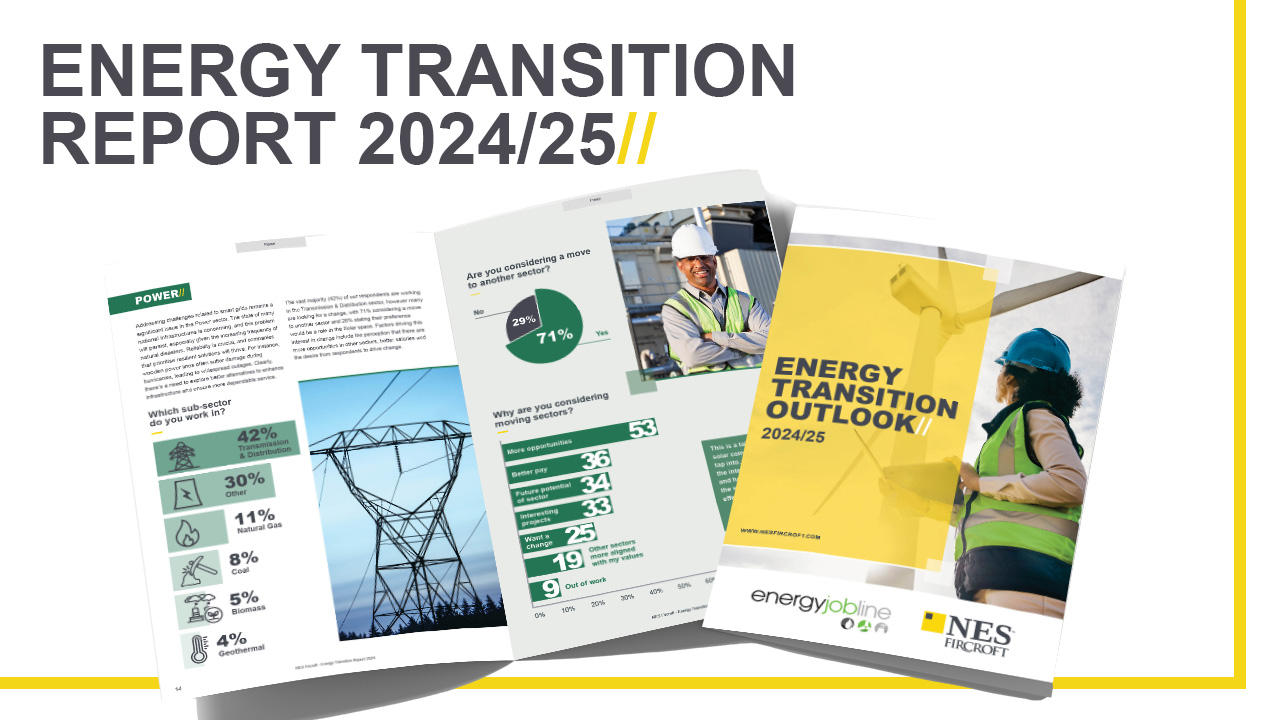Highlighting the Global Chemical Engineering Skills Gap
19 Jun, 20248:00The chemical engineering skills gap is a global issue that must be understood before being a...

The chemical engineering skills gap is a global issue that must be understood before being addressed across various industries. Chemical engineering jobs are expected to be in high demand over the next decade and beyond, especially in areas such as renewable energy, as nations continue to use engineers to implement environmentally friendly practices to reach their sustainability targets.
In this guide, we’ll highlight the global chemical engineering skills gap and answer two key questions: ‘Where are Chemical Engineers in Demand?’ and ‘What Chemical Engineering Skills Are in Demand?’. Understanding this will allow you to take the next step in addressing your chemical engineering recruitment strategy to ensure it’s focused on attracting and retaining the best people with the right skill set from across the globe.
This blog will highlight the following:
- Highlighting the Chemical Engineering Skills Gap
- Where are Chemical Engineers in Demand?
- What Chemical Engineering Skills Are in Demand?
Where are Chemical Engineers in Demand?
Regarding the geographic impact of the chemical engineering skills gap, the demand for talent with essential credentials varies by country. From the US and the UK to broader parts of North America and Europe, these are regions where chemical engineers are in high demand and who will be keen to tackle the skills shortage within the chemical industry.
United States
According to the Bureau of Labor Statistics, the projected growth rate of chemical engineering professionals in the US is 8% between 2022 and 2032. These predictions are based on the demand for chemical engineers in traditional industries such as oil and gas and evolving sectors such as renewable energy. In 2022, over 20,000 chemical engineering jobs were filled, with an average of around 1,300 roles expected to be vacant each year over the decade as people move into different occupations or retire.
US enterprises looking to improve their chemical engineering recruitment strategy and close the skills gap typically seek entry-level talent with at least a degree in chemical engineering or related subjects. They’re also expanding their search to candidates who have gained experience through internships or renowned educational programmes.
On average, companies hiring chemical engineers offer skilled contract and permanent professionals $112,100 per year or $53.90 per hour. These competitive salaries are offered to attract and retain engineers to help close internal talent shortages and skills gaps.

United Kingdom
With the UK continuing to hone in on its net zero 2050 targets, one sector they’re turning to is the engineering industry. As reported by Lightcast on behalf of EngineeringUK, ‘green’ engineering jobs have surged by 55%, and the demand for ‘green skills’ has risen by 48% since 2016 and 2017.
The report stated that as of 2021, there were around 6.1 million engineering jobs across all industries, representing 19% of jobs in the UK. Engineering roles, including those in the chemical industry, are expected to increase to nearly 6.26 million jobs by 2030.
Additionally, the report states that engineering jobs are forecasted to increase year-on-year up to 2030, resulting in an additional 173,000 jobs. This projected growth is a 2.8% increase by 2030, greater than the average growth of 2.3% for all other occupations. Regarding the skills gap, the report highlights that fields, including chemical engineering, have seen the fastest growth rates.
The rising demand for engineers in the UK is also evident in the average salaries. For engineers, the average advertised pay is around £38,600, which is close to 30% higher than the average of roughly £30,000 across all occupations.
Adding to this, as of June 2024, Indeed states that the average salary for chemical engineering jobs in the UK is £35,447. With this being above the average salary of all UK jobs and having the opportunity to support renewable energy efforts, companies are doing their utmost to entice talent to their chemical jobs to close the industry-wide skills shortage.

Asia, Australia, North America and Europe
As we look further afield on a global scale, many other countries consider chemical engineering skills a high priority. They offer high salaries to attract and retain the best engineers while closing the skills gap worldwide. As Insider Monkey reported, based on research by the ERI Economic Research Institute, here are the other countries offering the highest salaries for chemical engineers and where talent is in demand.
- Australia: Representing 10% of IChemE’s global membership base, Australia employs a significant number of chemical engineers in roles across the manufacturing, scientific services, and mining industries. With a strong market demand, chemical engineering jobs Down Under have an average salary of $99,979.
- Belgium: Recording revenue in the second quarter of 2023 standing at over €11 billion, the chemical industry in Belgium significantly supports the nation's economy. In 2021, the country provided over 65,000 direct and 150,000 indirect chemical engineering jobs. Attracting the world’s top chemical engineers, Belgium offers an average of $99,721.
- Canada: Major multinationals such as BASF, Dow Chemical, and Pfizer have a significant presence in Canada, so chemical engineers are highly regarded nationwide. Along with the various sectors of biotechnology, environmental engineering, pharmaceuticals, and petrochemicals, Canada’s Express Entry scheme provides many opportunities for chemical engineers. The average salary for chemical engineering jobs in Canada is $97,550.
- Denmark: Much of the demand for chemical engineers in Denmark comes from the pharmaceutical sector. As the nation focuses on waste management and renewable energy efforts, with the city of Copenhagen aiming to become carbon neutral by 2025, chemical engineers are in demand to support environmental protection and sustainability practices. Chemical engineers in Denmark can expect an average salary of $102,964.
Regarding sustainability, read our guide on how Chemical Companies are Embracing Sustainability. - Germany: Major organisations, including European chemical giant BASF, boasting over 150 years of experience in chemical manufacturing, are continuing to expand. This expansion, which is greatly focused on producing alkoxylate for automotive, cleaning and construction uses, calls for an increased demand for chemical engineers. The average salary for chemical engineering jobs in Germany is $100,609.
- Iceland: The demand for chemical engineers in Iceland is often found in aluminium production and geothermal energy sectors, the latter of which powers 25% of the nation's electricity. With Iceland’s population being smaller than most, the talent pool of skilled chemical engineers is limited. As a result, the salaries for chemical engineering jobs are high, with the average salary being $100,219.
- Japan: With chemical industry powerhouses such as Mitsubishi Chemical Corporation and Sumitomo Chemical, Japan is offering salaries of $93,727 for chemical engineering jobs. These roles involve speciality chemicals, materials science, and pharmaceuticals.
- Norway: With the average salary of chemical engineering jobs being $93,096, Norway’s robust oil and gas sector offers lucrative opportunities in upstream and downstream processes, from extraction and refining to petrochemicals. The country's focus on renewable energy drives demand for skilled chemical engineers, particularly in carbon capture and hydrogen production.
- Switzerland: As reported by Insider Monkey, Switzerland is eager to close the chemical engineering skills gap by offering talent the highest average salary worldwide. With average salaries for chemical engineering jobs being $152,894, much of the demand for skilled engineers comes from biotechnology and pharmaceutical companies such as Roche and Novartis.
What Chemical Engineering Skills Are in Demand?
If your business is seeking to address the chemical engineering skills gap, it’s essential to identify the industry's top skills and credentials. These skills should be vital traits to seek out in the professionals within your current and future chemical engineering jobs. Factoring these technical and soft skills into your talent acquisition strategy will help your chemical engineers adapt to evolving industry needs, trends, and technologies.
- Analytical Skills
- Interpersonal Skills
- Project Management Skills
- Math Skills
- Problem-solving Skills
- Research Skills
- Attention to Detail
- Tech Skills
- Science Skills
- Design Skills
In addition to these chemical engineering skills, organisations looking to close the skills gap should also seek out talent or enrol their existing engineers on these qualifications:
- Bachelor’s degree in…
- Chemistry
- Environmental engineering
- Biochemical engineering
- Process engineering
- Biomedical engineering
- Nuclear engineering
If your talent has a degree in the subjects above, they could be enrolled on a Master’s degree to advance their knowledge and skill set in your required area of chemical engineering.
Whether through an internship, apprenticeship or internal upskilling scheme, you can close the skills gap within your business by upskilling your existing workforce and future hires in the below chemical engineering certifications:
- Certified Chemical Engineer (CCE)
- Certified Energy Manager (CEM)
- Certified Hazardous Materials Manager (CHMM)
- Certified Process Safety Auditor (CPSA)
- Certified Quality Engineer (CQE)
- Certified Reliability Engineer (CRE)
- Certified Water Professional (CWP)
- Environmental Health and Safety (EHS) Certification
- Licensed Professional Engineer (LPE)
- Professional Engineer (PE) Licence
- Safety and Chemical Engineering Education (SAChE)
- Six Sigma Green Belt Certification
When considering which chemical engineering skills are in demand within your business, think beyond your existing talent pool. You may have engineers or skilled professionals in other departments with the transferable skills or potential qualities to transfer into your chemical engineering jobs and help you close your internal skills gaps.

Final Thoughts on the Chemical Engineering Skills Gap
The chemical engineering skills gap poses significant challenges across multiple industries worldwide, from the energy and pharmaceuticals sectors to the food and beverage and construction space. Understanding this skill shortage is essential to maintain your company's competitiveness, innovation, and operational efficiency before you begin addressing it.
By understanding where chemical engineers are in demand and recognising the critical skills required, your business can start implementing effective strategies to attract, develop, and retain the necessary talent to bridge this gap and support industry growth. For more information on how to engage top engineering talent, along with solutions on controlling costs and compliance, download how latest chemical whitepaper here.
Specialists in Chemical Engineering Recruitment
If you’re seeking support to close the skills shortage within your business, we can help. Our specialist consultants understand the intricacies of the chemical engineering recruitment space and have access to an extensive global talent network. We can connect you with the world’s most highly skilled permanent and contract chemical engineers to help you combat your internal skills gap.
Contact NES Fircroft today and discover how our talent acquisition services can support you with your chemical engineering recruitment needs.









